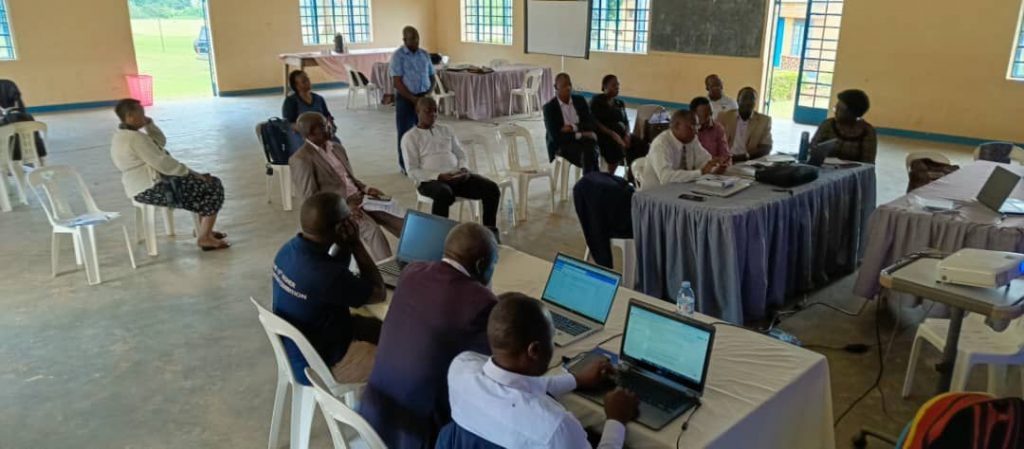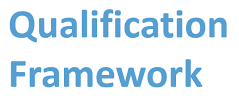The Uganda National Qualifications Framework National Task team at the Ministry of Education and Sports held a retreat at Bishop wills Core Primary Teachers College in Iganga from 1st to 5th July 2024, to draft the structure and content of the UNQF including level descriptors, knowledge skills and competencies.
The new National Qualifications framework will harmonize and ease the Ugandan Education System as it aims at bridging both the academic and vocational qualifications to the national and international standards. The Uganda NQF will enhance the Ugandan qualifications to the global level which will also facilitate the Ugandans academically and in their occupational growth.
It has been many years now that the Ugandan education system has not addressed the issue of unifying the various education systems that were highly segmented and thus limiting the education progression of its citizens. Thus, making it difficult for Uganda to compete in the regional as well as global labor markets. The UNQF is aimed at resolving these issues by creating an integrated national structure, within which there shall be mobility among the different education sectors including primary, secondary, vocational and tertiary.
The UNQF is looking at complementing some of the existing international frameworks such as the ACQF for higher education or the European Qualification Frameworks. This will now position Uganda at an advantage of being able to make structured assessments of national qualifications frameworks in other countries’ standards and not lagging behind in being the regional hub to develop and implement a strategy to grow the workforce.
Toward achieving this ambition, strategic initiatives have been outlined in Uganda’s Vision 2040 which aims to establish an internationally acclaimed education system able to produce highly skilled and proficient individuals. It also extends it to the National Development Plan (NDP) III which seeks to transform Uganda into a modern and prosperous economy in 30 years. It further actualizes Uganda’s commitment to Sustainable Development Goal 4 (SDG 4), increased access to inclusive and equitable quality education, and effective lifelong learning opportunities for all.
Overview of Key Objectives of the UNQF
The UNQF is not a mere policy tool but a strategic foundation to economic and social development. Key objectives of this framework include:
- Integration of Learning Systems: Formal, informal, and non-formal learning are integrated in this framework as a way of recognition of various types of knowledge acquisition and competencies in all educational sectors.
- Aligning Qualifications to Labor Market: The UNQF aligns qualifications to the current and emerging needs in the Ugandan and international labor market, hence making the graduates employable.
- Recognition of Prior Learning: The framework incorporates an RPL process that recognizes knowledge and skills acquired through life or work experience. This, therefore, provides the opportunity for certification of competencies regardless of the site or mode of acquisition.
- Mobility and Flexibility: UNQF facilitates student and worker mobility both intra- and inter-region through the standardization of qualifications. It promotes easy transition along educational pathways and also enhances employability in various sectors.
- Promoting Lifelong Learning: The UNQF avails the opportunity for lifelong learning, whereby there is constant development of skills, necessary for any evolving labor market.
- Ensuring Quality and Comparability: The framework sets up quality standards for various qualifications, allowing Ugandan qualifications to be of quality and comparable in the global arena.
Structural Outline of the UNQF
The UNQF is comprised of nine levels of qualifications beginning from the earliest educational qualification to the highest of post-doctoral qualification levels. This framework is supported by a set of descriptors which define the anticipated learning results, competences, and skills to be achieved within each level. The level descriptors help the educators, learners, employers and the policy-makers to understand the quality of the individual’s competences and knowledge associated with a given qualification level. The framework then includes clear pathways for the progression of the students thereby enabling the students to move from one level to the other easily regardless of the study approach, whether conventional or non-conventional.
Key elements of the UNQF include:
- Level descriptors-for each of the nine levels, given characteristics are clearly articulated to express the expected depth of knowledge, skills, and behavioural attributes at each level. These will further explain what an individual shall know and be able to do at each level in terms of clarity of what has to be learned and assessed to render the workforce ready.
- Qualification Mapping: This framework includes a qualification map, stating the types of qualification available at each level and defining their competency and skill levels. Further, it will increase the capability of the employer and education institution to better understand the qualification and capabilities of a candidate.
- Credit Transfer and Exemption System: The system will facilitate the movement of students in and from other institutions both within and outside Uganda. This will ensure that credits earned within one institution are recognized by other institutions, especially the credit system for learners who might have to interrupt their studies and rejoin later without losing their accrued credits.
- Database of Qualifications: The UNQF shall be supported at a national level by a database that will register all recognized qualifications for transparency and access to information by employers, education providers, and students. This digital repository shall facilitate the processes of verification and evaluation of qualifications to assist Ugandans in seeking opportunities both nationally and internationally in support of verification and evaluation purposes.
Recognition of Prior Learning: A Game Changer for Skills Development
One of the most advanced elements of UNQF is probably the system of Recognition of Prior Learning (RPL) that enables Ugandans to institutionalize the skills they earn through non-formal sources, including, but not limited to, on the job training, life skills or community based learning. Also, In RPL condition, a person has the right to support the claims on his/her competence assessment with a portfolio, testimonials or live performance where competence is assessed against set standards. The awarded certification to qualifying candidates enables them to pursue their education, providing an opportunity for those who have no other means of accessing a structured education.
The influence of RPL will be notable especially considering the fact that a huge segment of Uganda’s workforce is engaged in the informal sector. By incorporating the recognition and certification of skills gained informally, the UNQF will be able to channel skilled people into better jobs which will lead to higher incomes and increased contribution to the economy.
Implications for the Economy and Workforce
The UNQF will increase economic development within Uganda by ensuring that education is relevant to the industry. This will allow employers to have a straightforward and reliable way of evaluating the qualifications of new entrants into employment thereby restoring faith in the competence of the Ugandan graduates. The UNQF promotes clarity and recognition of qualifications earned by individuals and in turn encourages filling of positions in Uganda and the East African region as a whole which is very important in this current economic situation.
The framework is most applicable in the Technical and Vocational Education and Training (TVET) sector within Uganda which is essential in providing the labor force in key economic areas. Efforts to integrate the UNQF to the vocational qualifications will mean that the supply of people with the right skills levels will meet the demand in all the sectors such as agriculture, health, manufacturing, building and construction as well as information communication technologies (ICT).
International Alignment and Uganda’s Strategic Positioning
The UNQF will not only raise standards for Ugandan education but also align with other major international frameworks, such as the African Continental Qualifications Framework and the East African Community Qualifications Framework. All this is bound to make Uganda a rival player in the global arena of education and the labor market, hence opening up opportunities for Ugandans to pursue their education and career interests beyond national borders.
By supporting regional integration, UNQF is implementing the vision of the East African Community for a common market that will guarantee the free flow of competent labor in East Africa, especially in professions that are in high demand like engineering, health, and education.

Participants in session
The Way Forward: Implementation and Challenges
The implementation of the UNQF necessarily requires the collaboration of government agencies, educational institutions, employers, and professional bodies, though it may provide a very ambitious vision. In establishing a regulatory framework, training of assessors for RPL, and investing in digital infrastructure at the qualifications database level, some of the important steps in implementation will be undertaken. The added ability to develop public awareness campaigns regarding the benefits of the framework and how citizens can engage with this new system will also be necessary.
Conclusion: A Transformational Milestone for Uganda
The Uganda National Qualifications Framework takes a transformational approach toward the development of education and the workforce, promising to advance the competitive position of Uganda within the international community. By standardizing and uplifting qualifications, the UNQF will provide a suite of qualifications that give confidence to Ugandans throughout their learning journey, from primary school students to accomplished professionals. It is against this backdrop that, as Uganda prepares for this remarkable skeleton of implementation, full potential in its human capital is about to be unlocked for a skilled, adaptive, and globally competitive workforce.

